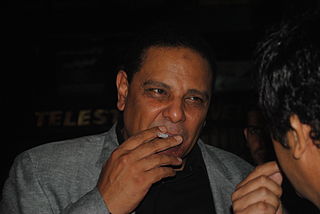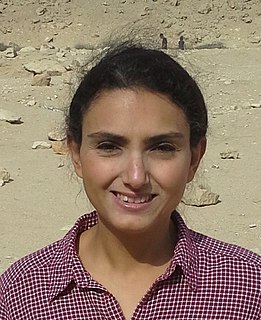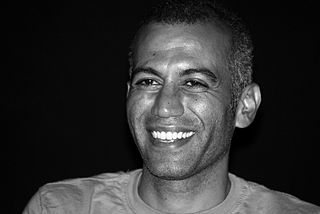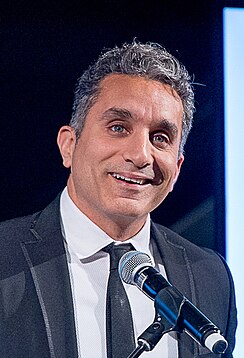Related Research Articles
Yosri Fouda, is an Egyptian investigative reporter, author, and television host. He established Al Jazeera's office in London and was one of the star figures in the channel until he resigned in 2009. Currently Fouda is a television host at the Cairo-based ONTV Egyptian Channel. He co‑authored Masterminds of Terror: The Truth Behind the Most Devastating Attack The World Has Ever Seen, published in 2003 by Arcade Publishing.

Alaa Al-Aswany is an Egyptian writer, and a founding member of the political movement Kefaya.

Ahmed Mohamed Shafik Zaki is an Egyptian politician and a former candidate for the presidency of Egypt. He was a senior commander in the Egyptian Air Force and later served as Prime Minister of Egypt from 29 January 2011 to 3 March 2011.

Reem Bassiouney is an Egyptian author and professor of sociolinguistics, currently teaching at The American University in Cairo. She has written several novels and a number of short stories and won the 2009 Sawiris Foundation Literary Prize for Young Writers for her novel Dr. Hanaa. While a substantial amount of her fiction has yet to be translated into English, her novel The Pistachio Seller was published by Syracuse University Press in 2009, and won the 2009 King Fahd Center for Middle East and Islamic Studies Translation of Arabic Literature Award. Bassiouney also won Naguib Mahfouz Award from Egypt's Supreme Council for Culture in the best Egyptian novel category for her best selling novel, The Mamluk Trilogy.

A presidential election was held in Egypt in two rounds, the first on 23 and 24 May 2012 and the second on 16 and 17 June. The Muslim Brotherhood declared early 18 June 2012, that its candidate, Mohamed Morsi, won Egypt's presidential election, which would be the first victory of an Islamist as head of state in the Arab world. It was the second presidential election in Egypt's history with more than one candidate, following the 2005 election, and the first presidential election after the 2011 Egyptian revolution which ousted president Hosni Mubarak, during the Arab Spring. However, Morsi's presidency was brief and short-lived, and he later faced massive protests for and against his rule, only to be ousted in a military coup in July that year.

National Association for Change(Arabic: الجمعية الوطنية للتغيير) is a loose grouping of the various Egyptian of all political affiliations and religion, men and women, including representatives of civil society and young people aims to change Egypt. There was general agreement on the need to unite all the voices calling for change within a National Assembly. Mohamed ElBaradei is in-charge of the National Association for Change. The movement aims for general reforms in the political scene and achieving some of those procedures and guarantees necessitates the amendment of articles 76, 77, and 88 of the constitution as soon as possible. Worth mentioning is that the banned political group the Muslim Brotherhood were represented by one of their key figures who attended the meeting however their stand in accepting a non-member of their group as a candidate is yet unclear. It is also unknown whether Amr Moussa the head of the Arab League who met with Elbaradei a day earlier will be part of the new movement. The goal of the group is to bring about political reform based on democracy and social justice.

The Egyptian revolution of 2011, also known as the 25 January Revolution, started on 25 January 2011 and spread across Egypt. The date was set by various youth groups to coincide with the annual Egyptian "Police holiday" as a statement against increasing police brutality during the last few years of Mubarak's presidency. It consisted of demonstrations, marches, occupations of plazas, non-violent civil resistance, acts of civil disobedience and strikes. Millions of protesters from a range of socio-economic and religious backgrounds demanded the overthrow of Egyptian President Hosni Mubarak. Violent clashes between security forces and protesters resulted in at least 846 people killed and over 6,000 injured. Protesters retaliated by burning over 90 police stations across the country.

The following is a chronological summary of the major events that occurred during the Egyptian Revolution of 2011, after Hosni Mubarak's resignation as the fourth President of Egypt, on 11 February 2011. This article documents the second wave of the revolution. The second wave began on 12 February 2011 when the Supreme Council of the Armed Forces assumed control of the country and it ended on 30 June 2012, when Mohamed Morsi was sworn in as the fifth President of Egypt.

Hossam el-Hamalawy is an Egyptian journalist, blogger, photographer and socialist activist. He is a member of the Revolutionary Socialists and the Center for Socialist Studies.

The Free Egyptians Party is an Egyptian liberal party, founded after the 2011 Egyptian revolution. It supports the principles of a liberal, democratic, and secular political order in Egypt. The Free Egyptians Party is the largest party in the House of Representatives.

Bassem Raafat Mohamed Youssef is an Egyptian comedian, writer, producer, surgeon, doctor, media critic, and television host, who hosted El-Bernameg, a satirical news program, from 2011 to 2014. The press has compared Youssef with American comedian Jon Stewart, whose satire program The Daily Show inspired Youssef to begin his career. In 2013, he was named as one of the "100 most influential people in the world" by Time magazine. Youssef's current projects are Tickling Giants, The Democracy Handbook, and Revolution For Dummies.
Ibrahim Eissa is an Egyptian journalist and TV personality best known for co-founding the popular Egyptian weekly Al-Dustour. He is currently editor-in-chief of Al Tahrir, which he co-founded in July 2011.
Reem Maged is an Egyptian journalist and former host of the popular Baladna bel Masry talk show on Egyptian ONTV. Maged's popularity and renown have dramatically increased due to her critical coverage of political events since the 2011 Egyptian revolution, as well as her hosting of individuals on her show that are critical of the military Supreme Council of the Armed Forces, or SCAF, that has ruled Egypt since the resignation of Hosni Mubarak. She has been described as "Egypt’s best and arguably most vocal [female voice] in delivering the true happenings to the country on a nightly basis." Maged stopped presenting the show in 2013 and in 2014 joined a hunger strike campaign in solidarity with political prisoners.
Hosted by Egyptian journalist Reem Maged, Baladna bel Masry is a daily Egyptian talk show broadcast by Egyptian satellite television network ONTV. The show airs Sunday-Thursday at 8:30pm. The ONTV network bills the show as reflecting "all the cultural & entertainment affairs that occur in Egypt," while at the same time offering in-depth analysis on events that accurately represents public views on current affairs.
Al Tahrir TV Channel is a privately owned Egyptian television channel that was launched in February 2011 following the 2011 Egyptian Revolution. It was the first channel to be launched in Egypt following the Egyptian revolution. The channel operates on Nilesat Frequency 11526-horizontal and its slogan is "The People Want to Liberate The Minds".

Al-Bernameg was an Egyptian news satire program. The show was hosted by Bassem Youssef on the free-to-air channel MBC MASR and reruns are aired on Deutsche Welle; it was formerly broadcast on the satellite channels CBC and OnTV Egypt. Bassem Youssef announced on 2 June 2014 that the show was cancelled.
The 2012 Egyptian presidential debate was the first-ever presidential debate held in Egyptian history as well as the first in any Arabic-speaking nation-state. Held in preparation for the upcoming presidential election, it was held between presidential candidates Abdel Moneim Aboul Fotouh and Amr Moussa (independent). It was broadcast live on ONtv on May 10, 2012 and moderated by Yosri Fouda of ONTV and Mona el-Shazly of Dream TV. The format was developed for ONTV by an Egyptian company: Belail Media Production and Consulting.
The Shafik Cabinet was led by prime minister of Egypt Ahmed Shafik from 31 January 2011 to 3 March 2011.
Qsoft is a media company. It is one of the biggest YouTube partners in the MENA region.
References
- 1 2 3 "The Egyptian Naguib Sawiris launches a competing channel Al-Jazeera". Technology Data. 30 September 2011. Archived from the original on 7 July 2012. Retrieved 10 May 2012.
- ↑ "معلومات عنا". ontveg.com. Archived from the original on 10 April 2012. Retrieved 10 April 2012.
- 1 2 3 El-Saeed, Youmna (9 March 2011). "The Episode That Toppled an Egyptian Cabinet". onislam.net. Retrieved 10 April 2012.
- ↑ "In Egypt, Television Confronts State; TV Wins". Connected in Cairo. 7 March 2011. Retrieved 10 April 2012.
- 1 2 Luhnow, David (5 March 2011). "Egypt PM Undone by TV Debate". The Wall Street Journal. Retrieved 10 April 2012.
- ↑ "Unforgettable night in the Arab TV history". Egyptian Chronicles. 3 March 2011. Retrieved 10 April 2012.
- ↑ "EGYPT: TV showdown imperils former Prime Minister Ahmed Shafik". The Los Angeles Times. 3 March 2011. Retrieved 10 April 2012.